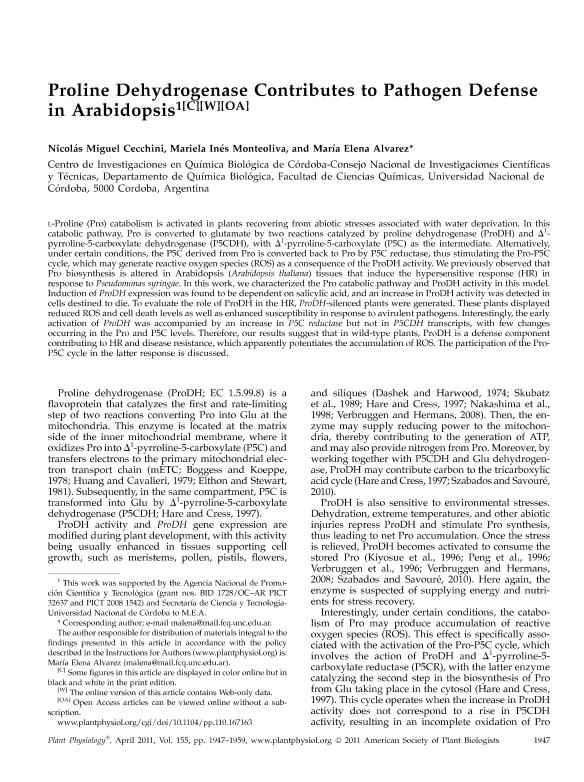Artículo
Proline dehydrogenase contributes to pathogen defense in Arabidopsis
Fecha de publicación:
10/02/2011
Editorial:
American Society of Plant Biologists
Revista:
Plant Physiology
ISSN:
0032-0889
e-ISSN:
1532-2548
Idioma:
Inglés
Tipo de recurso:
Artículo publicado
Clasificación temática:
Resumen
L-Proline (Pro) catabolism is activated in plants recovering from abiotic stresses associated with water deprivation. In this catabolic pathway, Pro is converted to glutamate by two reactions catalyzed by proline dehydrogenase (ProDH) and delta 1-pyrroline-5-carboxylate dehydrogenase (P5CDH), with delta 1-pyrroline-5-carboxylate (P5C) as the intermediate. Alternatively, under certain conditions, the P5C derived from Pro is converted back to Pro by P5C reductase, thus stimulating the Pro-P5C cycle, which may generate reactive oxygen species (ROS) as a consequence of the ProDH activity. We previously observed that Pro biosynthesis is altered in Arabidopsis (Arabidopsis thaliana) tissues that induce the hypersensitive response (HR) in response to Pseudomonas syringae. In this work, we characterized the Pro catabolic pathway and ProDH activity in this model. Induction of ProDH expression was found to be dependent on salicylic acid, and an increase in ProDH activity was detected in cells destined to die. To evaluate the role of ProDH in the HR, ProDH-silenced plants were generated. These plants displayed reduced ROS and cell death levels as well as enhanced susceptibility in response to avirulent pathogens. Interestingly, the early activation of ProDH was accompanied by an increase in P5C reductase but not in P5CDH transcripts, with few changes occurring in the Pro and P5C levels. Therefore, our results suggest that in wild-type plants, ProDH is a defense component contributing to HR and disease resistance, which apparently potentiates the accumulation of ROS. The participation of the Pro-P5C cycle in the latter response is discussed.
Archivos asociados
Licencia
Identificadores
Colecciones
Articulos(CCT - CORDOBA)
Articulos de CTRO.CIENTIFICO TECNOL.CONICET - CORDOBA
Articulos de CTRO.CIENTIFICO TECNOL.CONICET - CORDOBA
Articulos(CIQUIBIC)
Articulos de CENTRO DE INVEST.EN QCA.BIOL.DE CORDOBA (P)
Articulos de CENTRO DE INVEST.EN QCA.BIOL.DE CORDOBA (P)
Citación
Cecchini, Nicolas Miguel; Monteoliva, Mariela Inés; Alvarez, Maria Elena; Proline dehydrogenase contributes to pathogen defense in Arabidopsis; American Society of Plant Biologists; Plant Physiology; 155; 4; 10-2-2011; 1947-1959
Compartir
Altmétricas




